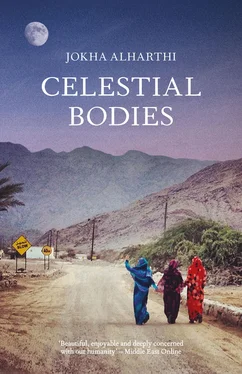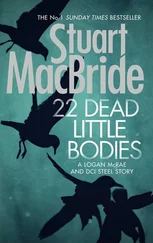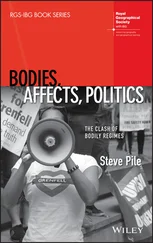At first London objected to the streets in the capital city that she said were designed only for ‘cars’ feet’. Then she adapted herself, and she even came to like the long stretch of paved seaside corniche. But she had a response for Salim: What there is in al-Awafi that isn’t in Muscat is the graveyard. Most people who live in Muscat aren’t buried in Muscat. They’re buried in their home villages.
On this evening she stopped her car at one of the Corniche parking areas along the Sib shoreline. She put out the lights and then she burst into sobs. I had not seen her cry even once, since her babyhood, until the year just past, on that day when her mother hit her and broke her mobile phone.
Honey, what is it? What’s wrong? Is it Hanan? She will recover, my dear. She’ll be all right.
London shook her head. It’s not Hanan. Even though, you know, her family refused to go to court about the rape because they were afraid of the scandal, and she gave in to them.
She tugged her embroidery-edged abaya closer around her body and slouched over the steering wheel. Ahmad and I used to come here, she said. He would tell me, Don’t turn around, and don’t get out of the car, there are young guys running around in shorts here, don’t open the window and don’t look out. I would say, Ahmad, you’re my love, I don’t see anyone but you! He would laugh, Papa, and he’d say, Why don’t you see anyone else? Are you blind or something?
When this anger overwhelms me, as it’s beginning to do right now, amidst all these clouds, I don’t know what to do with all of it. It won’t quit, and I can’t find any window for it to escape through. This anger — this rage that comes every time I picture her face as she talked, sitting there in the car. This single, fierce emotion stifles everything else, even my breathing. I have never felt so helpless in front of my anger as when my daughter was crying, and then confessing. I gave in to him, she gasped between her sobs, because I was afraid of failure.
I felt the same helpless anger when the nurse took out the tubes from my father’s body, her way of announcing he was dead. This anger of mine pursues me to the edge, where I’m screaming without making the slightest sound, crying without any tears. But it’s an anger that carries no force. All it accomplishes is that it keeps me from taking a breath.
I didn’t feel angry when I learned, long after the event, that Zarifa had died. I just felt as though the earth had given me a violent shaking. Suddenly, I was that lone child of so long ago, whom Sanjar and Marhun forced to steal the rifle and then deprived of eating any magpies. I felt like my father was going to punish me for leaving Zarifa to die far away and alone. He would punish me, lower me into the well trussed up in the palm-frond rope. I felt her loud ringing laughter vibrating through my body, sending my whole body into shudders in the dawn. Again, I heard her whispering. Your mother did not die, my boy, no, Abdullah. Your mother is alive. The jinndjinn guarding the basil bush — they took her away, but she is alive.
I opened all the windows in the new car and listened to the sound of the waves as if that would cover up the sound of my daughter’s crying. Why didn’t you tell me from the start? Why did you wait a year? A whole year!
She moaned. I couldn’t... I mean, I chose him. Every one of you rejected my choice, and so I insisted. What else could I do, after that? And I was happy in the beginning. So I just tried to ignore it. And how could I possibly confess to my mother that I was wrong? What would I say to you, to any of you?
So you waited until he actually beat you. That was what it took for you to say anything?
Her sobbing got louder and I remembered her mother’s wailing. He beats her? She said he beats her? The peasant’s son beats my daughter, mine ? And what kind of man beats his wife? In all of al-Awafi I have never heard of anyone beating his wife except for that old drunk Furayh. He used to come home soused and throw up on her, and then he would start hitting her. And so this educated ‘dokhtoor’ — as he calls himself, hah — is just another version of Furayh the drunk? He beats her? The peasant’s son beats my girl? No one ever put his hand on me and no one put his hand on my mother or my sisters, and now this dog comes and beats my little girl? What a scandal we must look amongst all the tribes, every clan, our own, out in the open. The man our daughter is already legally married to, even if, thank the Lord, they haven’t moved in together, and Furayh the drunk — they’re cut from the same cloth? By God, if only he had never set eyes on her! By God, he’s divorcing her today and he’d better do it fast.
He divorced her. We paid him the dowry and so my daughter got herself out of that marriage and got her freedom.
London, I said to her, Today you are free. You are a successful physician and you have your freedom and a good social life and he doesn’t deserve even a stray thought. It was just a bad experience, it’s over, and that’s that.
She breathed in the sea air and left her tears rolling down her cheeks. You’re right, Father. Just a bad experience.
The teenagers laugh and shout and open their cans of cola, the sea breeze grows colder, and I drive on the way back to al-Khuwayr, muttering to myself. God be praised that the actual wedding had not yet happened and the whole thing came to an end when they were still only bound by a nuptial contract.
Zarifa made up an enormous tray with samples of all the dishes that had been prepared for Mayya while she recovered from London’s birth. A plate of rice and chicken cooked in cloves and samna; that special flatbread with honey; a tower of apples, oranges and bananas, and a ladleful of jelly-sweets. Zarifa covered the tray, balanced it on her head, and left Salima’s house. She crossed the Falaj, the main canal, and then she passed the houses, the fortress-like complex where Shaykh Said and his family had lived forever, the school, and Hamdan’s shop before her path brought her to the farms. In the past, al-Awafi’s homes emptied completely on summer days, as everyone, young and old, converged on the farmers’ fields in flight from the heat, returning home only when the soft night-time breezes wafted them there. But by this time — the early years of the 1980s — there was no need for this daily exodus. Electric fans, even air conditioners in some of the houses, put an end to these excursions. Those ‘horrid new-fangled heretical air conditioners’, as Zarifa called them.
Not once lifting her hand to steady the heavy tray on her head, Zarifa continued on her way, reaching the bare, uncultivated ground beyond the farms. The desert opened out before her as she walked on. She was damp with sweat but it was only a few moments before she arrived and stopped, breathing with relief. At the foot of the familiar cluster of white boulders, Zarifa lowered the tray and then knelt down beside it, wiping away her sweat with the edge of her wrap. Her loud, rough voice sailed across the rocks. Ya Baqii-ooo! Here is your food, may you give us leave to have our food, this is your share and so you can leave our share to us. Here it is, Baqiia, here’s your khiratha, look, the special food of Mayya, daughter of Salima, may you leave her in peace, in her state of confinement as she heals... may you not strike her down or harm the newborn girl.
Zarifa got back up on her feet and began the return journey to al-Awafi. Only two days before, she had undertaken this very same errand to deflect evil, but that time to ward it away from the wife of her son, also recovering from childbirth and from her own new granddaughter. Time after time she had made the same excursion. They were always successful, these offerings of hers. The jinni Baqiia had never grown angry, not once over the long period that Zarifa had dedicated herself to the jinni’s service, nor in the era of her mother before her. Well, except that one time, when someone bewitched Umm Abdallah somehow while in her confinement. Before Zarifa, her mother had shouldered this duty and before that it had been her grandmother’s task. All of them knew the most particular secrets about Baqiia, the jinni woman who specialised in stalking any woman recovering from childbirth who did not feed her from her own special food. Poor wretched Umm Abdallah, Zarifa muttered. May God show her His mercy, poor simple woman, she was only minding her own business. But people don’t show any mercy, and this boy of hers... well, this Abdallah, a man who’s not in the caravan nor in the warring band, as the proverb-maker says. What a useless fellow, no one listens to him. What kind of man lets his wife give his daughter this strange name? But how can I say anything? The proverb-maker said: What you criticize others for, you’ll find you’ve got it in spades. And my son Sanjar — who named his daughter, now? By God, men no longer have any say in things. Not all men are Sulayman! Aye, wAllahi! There just aren’t any Merchant Sulaymans any more. No Shaykh Saids, either. God protect you with His mercy, Mama! Where are you? Come to me, come back to your daughter and just see what the world has become.
Читать дальше












